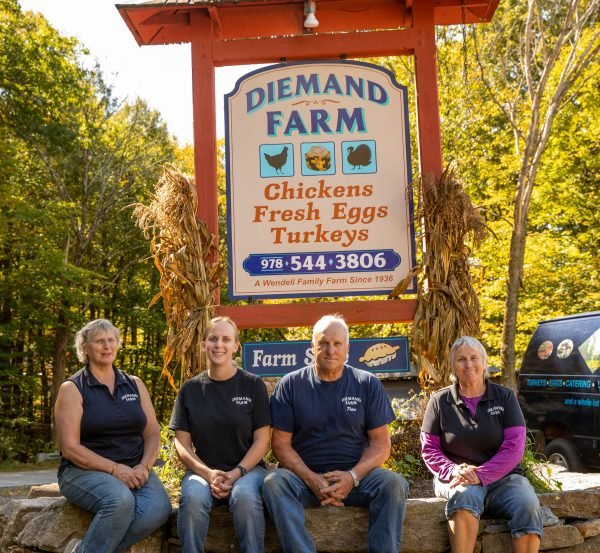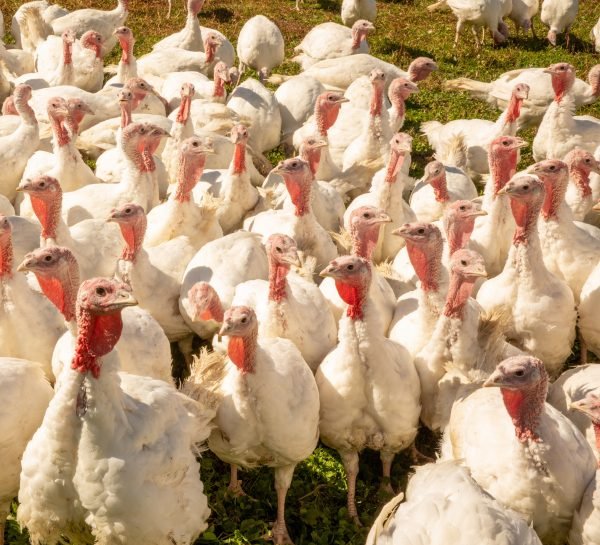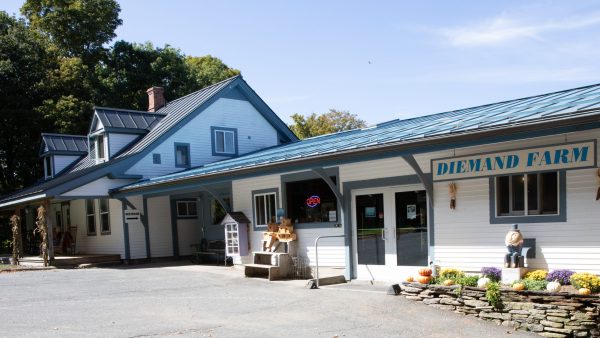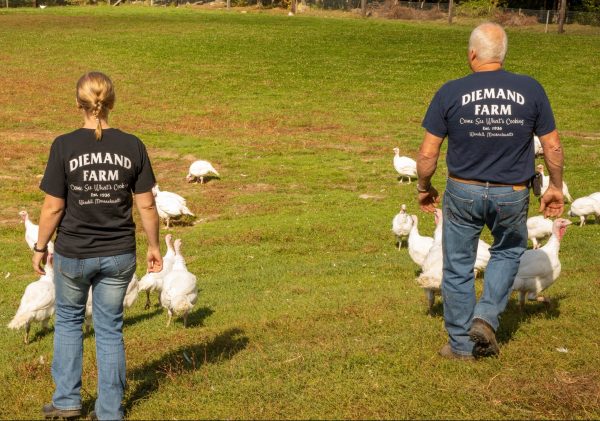Come See What’s Cooking at Diemand Farm
By Jacob Nelson
Listening to Annie Diemand Bucci talk about her family’s Diemand Farm feels a lot like opening the door of their farm store – it’s like walking into a warm hug. The joy that Annie and her daughter, Tessa White-Diemand, express when they talk about feeding people and carrying on their family’s farming legacy is palpable, and that care shines through in everything they do.
On the farm

Left to right, Annie Diemand Bucci, Tessa White-Diemand, Peter Diemand, and Faith Diemand (PC Elizabeth Solaka)
“My grandfather started the farm in 1936,” says Tessa, “and now I’m the third generation.” Today, Annie and her brother Peter are the second-generation Diemands still involved day-to-day, with Tessa coming up behind them.
“We raise chickens for eggs, chickens for meat, turkeys, and grass-fed cows,” Tessa continues. They also have a sawmill, and a commercial kitchen where they make all sorts of food with ingredients from the farm.
Historically, Annie says Diemand Farm was best known for their eggs, which
they still sell widely. But as regulations shifted, they downsized from 15,000 laying hens to around 1,500. These days, poultry rule the roost in a different way.
“We raise almost 6,000 turkeys a year,” says Tessa, “with about 3,000 sold fresh for Thanksgiving.” These birds arrive at the farm as day-old chicks and spend most of their lives outside on pasture.
They’re also raising more meat chickens. Explains Annie, “we listened to our customers who said, ‘your turkeys are so good, why don’t you try it?’ We started raising a few hundred birds a year, now it’s almost 4,000.”

Diemand Farm raises over 6,000 turkeys each year (PC Elizabeth Solaka)
In total, a few dozen cows and more than 11,000 birds spend part of their lives at Diemand Farm each year, a number that demonstrates the farm’s curious size. Compared nationally, you couldn’t call them a large farm. Yet for a local animal farm, they raise a significant amount of food for their local community.
As times evolve, the Diemands keep trying to find the right size for their family farm, navigating sales markets, the labor market, and farm regulations. Tessa provides an example.
“With our poultry, we process them all on-site ourselves,” she says. “That takes a lot of work, and it’s difficult to find enough help.”
Each year they need to call in other Diemand family members to work the big fall turkey harvest – often Annie and Peter’s siblings. While that constrains the number of turkeys they can raise, it does contribute to Annie’s favorite farm tagline – “every bird inspected by a Diemand grandma.”
In the kitchen
One reason Diemand Farm reaches so many customers with their food is their commercial kitchen, where they make a wide range of meals, dishes, and other products for sale at their farm store and elsewhere around the Valley.

The Diemand Farm store and commercial kitchen in Wendell, both part of the old farmhouse (PC Elizabeth Solaka)
Turkey pot pies are a staple. “They were my sister Faith’s idea,” says Annie. “We started wholesaling them almost 25 years ago, and at this point making them is pretty much a fulltime job.”
They also craft a few kinds of soups and chilis for wholesale, along with turkey bone broth and slow-roasted BBQ pulled turkey. Diemand Farm’s website (thediemandfarm.com) shows which stores carry their products across the state.
Still, the epicenter of activity – and really the essence of Diemand Farm – is their own farm store in Wendell. Says Tessa, “when people come into the store and see everything we do, they’re often blown away. If you’ve never been here, it’s definitely worth a visit.”
“Our kitchen is right at the store,” says Annie, “so people can see us making the food. We get people saying ‘oh my gosh, it smells so good in here! Like Thanksgiving, or my grandma’s home.’”
Fridges are stocked with fresh-made meals to-go and freezers are full of Diemand Farm meat and more frozen meals.
“You can definitely come get a lunch and sit out on the picnic tables or the porch,” says Annie. “We always have deviled eggs, chicken and turkey sandwiches, cold soups, drinks, and some kind of dessert.”
Take-and-bake options are a-plenty, from pies to casseroles to their signature turkey dinners with mashed potatoes, stuffing, gravy, and veggies. They’ll also do special catered orders for pick-up or delivery.
“Anything we make using chicken, turkey, or beef – it’s ours,” says Tessa. Any milk or cream comes from Mapleline Farm in Hadley, butternut squash from Joe Czajkowski Farm in Hadley, and all flour and butter they use is grown and made in New England. Local honey, maple syrup, wool, and drinks also find a home on store shelves.
Making it all work
“Even though our family has been farming for so long, there’s still so much to learn.” says Tessa. Annie agrees, saying that with so many uncontrollable risks and variables, “sometimes I almost feel like I’m a gambler, being a farmer.”

Tessa White-Diemand and Peter Diemand amid some of their pasture-raised turkeys (PC Elizabeth Solaka)
For farmers like the Diemands who wear so many hats, outside support is helpful. Tessa, for whom farming is a second career, puts this well.
“As a social worker for a dozen years, I always had organizations with resources I could turn to for help,” she says. “When I came back to the farm, I had all these questions for how to do things, and my family didn’t have all the answers.”
Whether it was questions about HR policy or support for grant-writing, “I learned I could call CISA,” she continues, “and either they’d have the answers, or could point me to someone who does.”
With a little help, Annie and Tessa are excited for the next chapter of their family farm’s story.
“When I’m processing turkeys or chickens,” says Annie, “I’ll look around, and it’s really cool to see my older sisters Faith and Mary – in their 70s – working like powerhouses, while I work across from my daughter. I think about my parents and what their vision was, and I think how proud they would be about what we’re doing.”
Like their t-shirts say, “Diemand Farm – come see what’s cooking.”